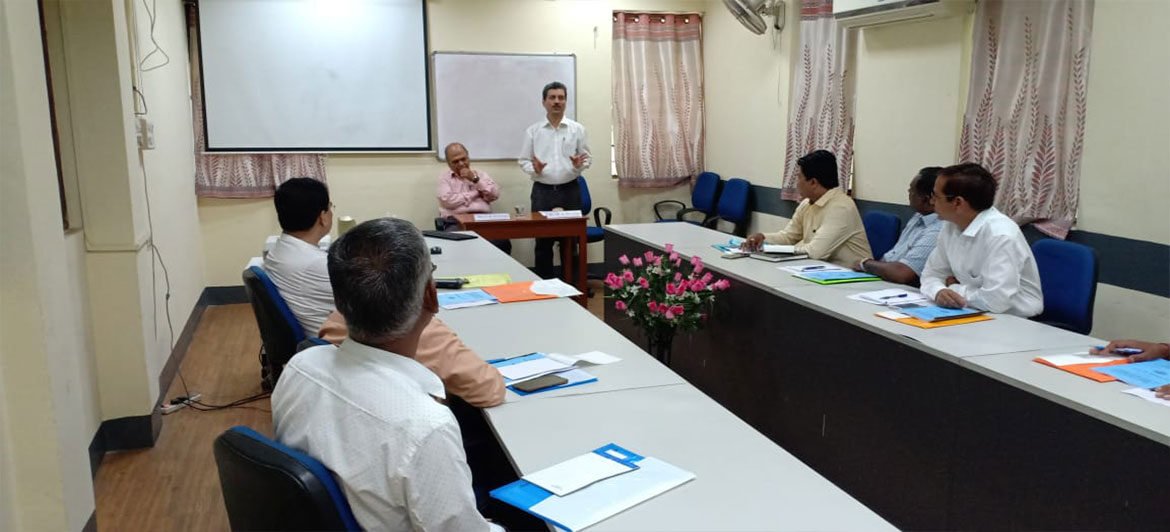Rrevised scheme and syllabus of Higher Diploma in cooperative management (HDCM)(26 weeks duration)
- Duration
- Intake Capacity
- Objective
- Course Contents
- Interspersal
- Admission
- Pedagogy
- Practical Training
- Assessment & Evaluation
- Categorization
26 Weeks
30 Participants
1. To develop change agents in cooperatives who can:
(a) Motivate the members and the managing committee to participate in the management of coop. enterprises;
(b) Achieve the enterprise goals by meeting the members as well as national goals.
2. To enrich the managers working in cooperatives by:
(a) Improving their conceptual capabilities in understanding the managerial problems of cooperatives;
(b) Upgrading their skills and abilities to use appropriate techniques for managing cooperatives; and
(c) Developing attitude approximate for achieving excellence in cooperative management and Administration.
(d) To Strive for cooperative growth as economic tool
| S.No | Course Title | Units | No.of Sessions |
|---|---|---|---|
| 1 | Environment for Cooperative & Rural Development and Agriculture | 1.5 | 45 |
| 2 | Cooperative Law and Administration | 2.0 | 60 |
| 3 | Cooperative Credit & Banking | 1.0 | 30 |
| 4 | Non-Credit Cooperatives | 1.0 | 30 |
| 5 | Accounts and Audit | 1.5 | 45 |
| 6 | MIS & Computer Application – I | 1.0 | 30 |
| Total | 8.0 | 240 | |
| Second Semester | |||
| 7 | Cost Accounting and Financial Management | 1.5 | 45 |
| 8 | Marketing Management | 1.0 | 30 |
| 9 | Allied Laws | 1.0 | 30 |
| 10 | Organizational Behaviour & Communication | 1.0 | 30 |
| 11 | Human Resource Management and Industrial Relations | 1.0 | 30 |
| 12 | Project Management | 1.0 | 30 |
| 13 | MIS & Computer Application – II | 1.0 | 30 |
| Total | 7.5 | 225 | |
| 6 | Interspersal | 26 Weeks | |
| First Semester(Class room training) | 12 | ||
| Observation Study Tour | 02 | ||
| Second Semester | 12 | ||
| (including 2 weeks Placement/Project Study) | |||
(a) Personnel working in Cooperative department and Cooperative Institutions with minimum qualification of graduation.
(b) Private candidate, fulfilling the minimum required qualifications, can be also be admitted. Selection of Private candidates will be made through open test to be conducted at each ICM.
(c) Scheduled Caste/Scheduled Tribes candidates will be admitted as per the norms fixed in this behalf by the Govt. of India.
(d) Maximum 40 years, relaxable in special cases.
As the focus of the course is on improving decision making skills, experiential method, role plays, in basket exercises, group discussions and presentations are used.
The focus of class sessions is on developing skills and attitudes through active student participation rather than on summarizing the reading materials through lectures. The participants are expected to study the recommended literature, cases and discuss within small groups outside the class room.
(a) On completion of the first term the participants will be deputed for observation study inside and outside to a cooperatively well developed state.
(b) During the second term two weeks Placement/Project Study tour will be assigned to participants inside the state.
(a) Each subject will carry 100 marks consisting of the following heads:
| (i) | Mid-Term Internal Class Test | 20 Marks |
| (ii) | Project/Assignments | 20 Marks |
| (iii) | Term End Examination | 60 Marks |
| Total | 100 Marks | |
| (a) | 13 subjects will have 13 x 100 | 1300 Marks |
| (b) | Evaluation of Observation Study | 50 Marks |
| (c) | Project/Placement Study Report and Viva-Voce (Report 100 Marks Viva 50 Marks) | 150 Marks |
| Grand Total | 1500 Marks | |
| 70% and above | Distinction |
| 60% but below 70% | First Class |
| 50% but below 60% | Second Class |
| 45% but below 50% | Third Class |
| Less than 45% | Failed |
![Co-operative Management Institute [ICM Pune]](https://www.icmpune.org/wp-content/uploads/2022/02/updated-icm-banner-new.png)
![Co-operative Management Institute [ICM Pune]](https://www.icmpune.org/wp-content/uploads/2022/02/updated-icm-banner-white.png)
